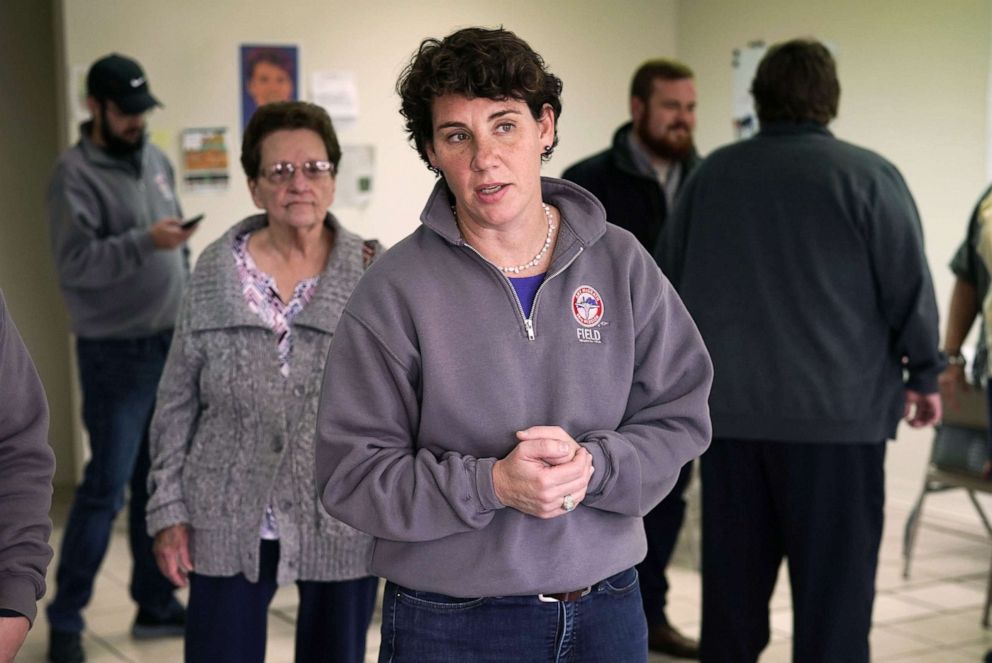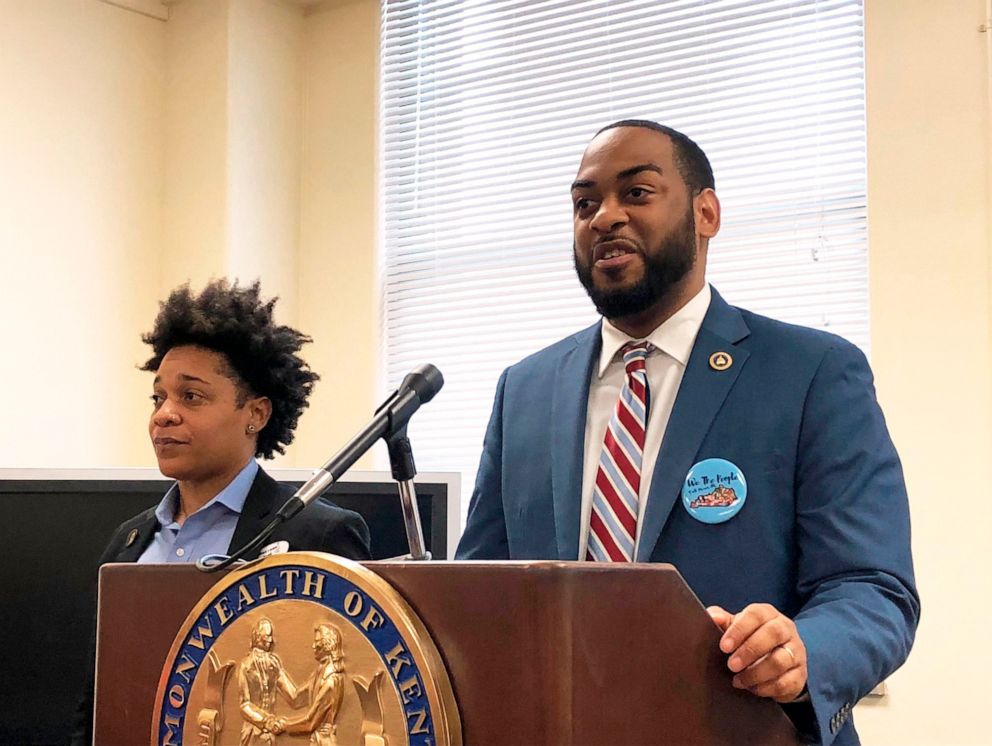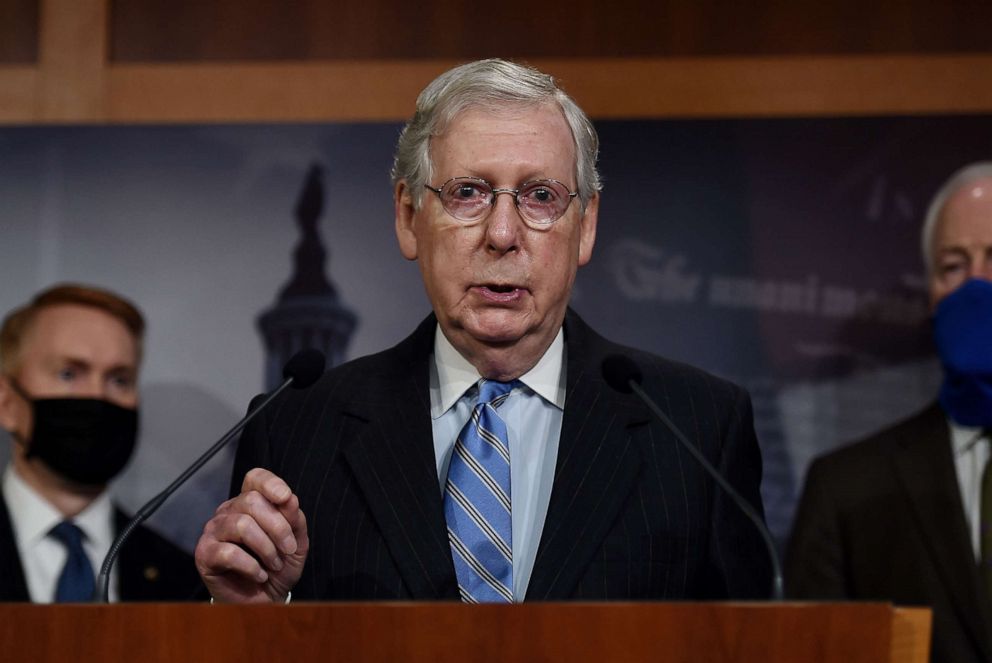Racial unrest seeps into Kentucky Senate primary, reshaping contest to take on McConnell
The Democratic primary between Amy McGrath and Charles Booker is heating up.
Amy McGrath, the former Marine fighter pilot, heads into Tuesday's Kentucky Senate primary the presumptive Democratic frontrunner to take on Senate Majority Leader Mitch McConnell, with the backing of the national Democratic establishment and a $41 million war chest. But it might not be enough to get through the primary.
After a string of recent killings of African Americans by law enforcement, including two within the state since mid-March, the contest is on new terrain, one in which the 2018 congressional candidate's advantages are struggling to offset the grassroots momentum that is sweeping her lesser-known rival, state Rep. Charles Booker, into contention for the nomination.
McGrath is a darling of national Democrats, earning the backing of the Democratic Senatorial Campaign Committee back in February and establishing her campaign as a fundraising behemoth since she launched her Senate bid in July 2019. But as Booker and his campaign cast her as a consultant-driven, more-of-the-same, moderate, "pro-Trump Democrat," McGrath invokes her outsider status to contrast herself with Booker, who she suggests is part of the "political establishment."
"Everybody wants to put you in a box. Everybody wants to have their label on you," McGrath said in an interview. "Not everybody fits this perfect label...I'm a marine. I don't define myself as being anything other than an American and a marine and a wife and a mother and yes, I'm a Democrat and I'm very proud of that."

McGrath quickly brushed off any concerns about Tuesday, when she is set to square off against Booker, and Mike Broihier, a retired Marine lieutenant colonel, saying "we're finishing this primary strong."
But it's hard to not take notice of Booker's insurgent candidacy, at a moment when widespread unrest is unsettling the country over deeply-rooted racial disparities.
A once-sleeper race turns competitive in final weeks
Booker, who centers his platform on several progressive planks, has garnered the backing of Congresswoman Alexandria-Ocasio Cortez, D-N.Y., the freshman phenom; Sen. Bernie Sanders, I-V.t., a leader of the progressive movement; Sen. Elizabeth Warren, D-Mass.; Tom Steyer, another former presidential contender; Rep. Ayanna Pressley, D-Mass., a member of the so-called "squad" alongside Ocasio-Cortez; and two of Kentucky's most widely circulated newspapers, The Lexington Herald-Leader and Courier-Journal.
He’s even scored the backing of Alison Lundergan Grimes, a prominent Democrat in Kentucky politics who formerly served as the secretary of state and even unsuccessfully tested her own bid against McConnell in 2014.
In the month of June alone, Booker has raised $2.3 million, which is nearly triple the total he’s raised all cycle, and is more than four times his pre-primary total, which stretches from April 1-June 3. But it still falls about $200,000 short of McGrath’s haul in the first 24 hours of her campaign, and pales in comparison to her total for the cycle.
But his campaign remains undeterred, and is currently spending about $1.1 million in TV ads, after launching its first TV ad in early June in an eleventh-hour push to make up the deficit with McGrath, who has been blanketing the airwaves for months.
"Everyday this race is changing seismically. Since the time we've been on the phone, I think Ayanna Pressley endorsed the campaign," said Karthik Ganapathy, a Democratic strategist who previously worked on Sanders’ presidential campaign in 2016 and is now working with the Booker campaign. "The race is changing every single day in Charles's favor."
The shifting dynamics of the race - and the late surge of momentum boosting Booker’s campaign - are fueled by the same energy that sparked dozens of protests over racial injustice across the country in the wake of the killing of Breonna Taylor, a 26-year-old black woman, in her home in Louisville, and the death of George Floyd in Minneapolis - both at the hands of police.
"The energy that we're seeing, it started with protests like here in Kentucky and in Louisville with Breonna Taylor. Cries for justice have evolved into conversations about structural change, and people are rising up all over the country," Booker, 35, the youngest black state lawmaker in the state, said in an interview with ABC News Live. "And so I'm going to Washington with a big coalition that will not accept the status quo."
"When Senate insiders decide which candidate they’re going to bless with their endorsement and the millions in contributions that come with it, the critical experience that a young Black man who has lost family members to gun violence, like Charles Booker, might bring with him to the Senate never enters the equation. And, that narrow vision leaves Congress and our country weaker," said Yvette Simpson, an ABC News contributor and the CEO of Democracy for America, a national progressive group, in a statement announcing the group's endorsement on Wednesday.
But experts warn that it remains to be seen how much that enthusiasm will translate into votes on Tuesday.
"Clearly, Booker has gained momentum...that being said, no one really knows how deep down into the electorate this new excitement for Booker is really spreading," said Steve Voss, an associate professor of political science at the University of Kentucky. "We don't know how many people have already marked up their absentee ballots back when the perception was a McGrath victory was inevitable. And once they submit a ballot, they're stuck with that vote even if circumstances change."
On Tuesday, Senate Minority Leader Chuck Schumer, the top Democrat in the upper chamber, reiterated his confidence in McGrath's standing in the race.
"Amy McGrath is our candidate," he told reporters. "She's a strong candidate. She's giving McConnell a run for his money…She's doing very well and I believe that she'll win the primary."
An electoral test of the country's reckoning on race
The race is emerging as an early electoral test for Kentucky Democrats of the impact of the last couple of weeks on what kind of candidate they want to put forward right now and for a candidate whose life story reflects much of the themes in the demonstrations.
"A lot of people are facing a lot of trauma, a lot of pain, and they are dealing with a lot of situations that are very similar to the struggle I've grown up in," Booker said. "We have been ignored for a long time and essentially my entire life. Mitch McConnell was elected two weeks after I was born, and no one cares about our concerns. No one asked what we want. They tell us what we want."
"When you speak to that struggle, because I've lived it, we're able to build a new type of movement of regular folks that realize we can't play politics anymore," he added.
In the wake of Floyd's death, the reckoning over structural racism and police brutality are seeping into nearly every aspect of the contest - in ads, in debates, and in the very core messages of the leading campaigns.
Booker has joined several protests in the state, including in his hometown of Louisville, where he invoked Dr. Martin Luther King Jr. when he told the crowd, "Peace is not the absence of violence and tension. Peace is the presence of justice."
At a recent debate, too, he acknowledged that the racial inequities at the center of the protests are what "informs my platform and why I'm running."
"We need results right now, and it means we have to acknowledge the challenges that are levied within our institutions to see someone that looks like me, that doesn't come from a lot, as a deadly weapon before a human being," he said earlier this month.

McGrath, for her part, said during that same debate that she had not yet participated in a protest on the ground, a moment Booker’s campaign turned into a digital video. But a few days later, she attended two interfaith vigils in Lexington and Louisville.
"The first thing we have to do is step back and listen to the families, listen to the communities who are so angry, and they should be, and commit ourselves to finding solutions," she told ABC News when asked how she would deal with the unrest, before adding, "to not only finding solutions with regards to criminal justice reform, which is so important, but also finding solutions for the underlying causes of racial injustice in America."
"I would be pushing the legislation in the Senate that deals with better training - racial bias training. We have this in the military," she continued. "Why can we not have this type of training for police forces around the country."
Kentucky, still, is ruby red
McGrath might be a political novice, never having held public office, but this is not her first time in the political ring. In 2018, she launched an unsuccessful bid for the 6th congressional district to much attention and praise after her campaign ad "Told Me" went viral. She ultimately lost the election to Republican Congressman Andy Barr by three percentage points, in a district that Trump carried by 15 points in the 2016 presidential election.
This year, she's seeking to win statewide in a state that Trump won by nearly 30 points, just one year after Democratic Gov. Andy Beshear narrowly toppled the deeply unpopular Republican incumbent Gov. Matt Bevin. But her second bid saw some early stumbles.
In one of her opening interviews for her Senate campaign, she told the Lexington Courier Journal she would have voted to confirm Justice Brett Kavanaugh to the U.S. Supreme Court, only to retract her statement by the afternoon, saying she would have voted no.
"You learn a lot as a first-time candidate," she said on Thursday about what she’s learned since her last campaign. "You learn a lot about how important name recognition is. You learn a lot about how you say things and that things can be taken out of context. And so I certainly learned quite a bit, and you also learn to get thick skin."
McGrath is also up against an even tougher road to the nomination this time around, and still in a state that heavily favors Republicans.
"I think they're two entirely different campaigns that result in a very similar place," said Josh Holmes, a Republican consultant and the former chief of staff and campaign manager for McConnell. "Amy McGrath's campaign is basically five irons down the middle of the fairway...there's no surprises."
"We're at a time when inauthenticity is the worst possible hand of cards that you could play and she's kind of played that hand of cards all the way through, which is why I think even with $40 million, she's had a rough go in the primary," he said.
But Booker, who might be more of a wild card, and his liberal policies could make McConnell's path to re-election even smoother in a state that is so overwhelmingly red, Holmes said.
"Charles Booker is very, very different obviously, extremely dynamic in the way he campaigns and would come at it with a lot of different energy," he said, before adding that his progressive policies are "basically disqualifiers for a general election statewide."

Experts, too, believe that a McConnell-Booker matchup is the preferred race for the top Republican.
"McConnell may be coy about the Democratic primary, but I have no doubt he'd rather face Charles Booker in November. It would just make his job a lot easier. The 'too liberal for Kentucky' message would be much easier to sell should he run against Booker than McGrath," Voss said.
The McConnell factor
Between the two, the race is coming down to an electability argument about who can ultimately defeat McConnell, with each Democrat making their own case in the closing weeks.
Booker, who often invokes his own life experiences, including his early struggles of growing up poor, with diabetes, and whose own family is the victim of gun violence, argues that it’s time for a new kind of Democrat, one that is actually reflective of the electorate.
"He's been in office for so long and the Democratic Party has tried to challenge him only by playing this political game of running to the soft center and saying that you're going to be approachable Democrat and people don't buy that BS," Booker said of competing against McConnell. "My campaign is speaking to Kentuckians and saying that we're going to do things differently. We're fighting for us for a change ... And so we will absolutely beat him."
McGrath, who often finds herself being criticized from both sides by suggestions from Booker that she's not a real Democrat and by attempts from McConnell's campaign to paint her as aligned with the liberal wing of the Democratic Party, is pitching herself as a "commonsense Kentucky Democrat" who is tired of the divisive partisanship.
"I will be able to stand up to any president, whether that president wears a red jersey or a blue jersey, to do what's right for Kentucky," she said. "That is, frankly, the biggest difference between myself and Mitch McConnell...I'm somebody that cares about the Constitution. I care about working with the other side to get things done when it's right for Kentucky. We need that, but also having the guts to stand up when it's right for Kentucky."
McConnell's campaign, though, is keeping their focus trained on McGrath, failing to mention Booker when asked broadly about the Democratic primary.
"Amy McGrath thought she could buy her way into a general election, but she is being soundly rejected by Kentucky Democrats. No candidate has ever spent so much to generate support that only exists outside of Kentucky," Kate Cooksey, a spokesperson for his campaign, said.
But no matter who wins the primary on Tuesday, GOP strategists view the general election as a near-impossible uphill climb for Democrats.
With an extensive record that spans over 30 years, McConnell brings "a really strong resume of deliverables," Holmes said, that always "made up the backbone of his campaigns."
"He's also campaigning with the benefit of a presidential ticket that's likely to win by steep double digits," he continued. "The pathway for a Democrat in a presidential election year in Kentucky is slim to none...It doesn't take a lot of outside the box campaigning in order to just execute."
The reality, Holmes said, is that "winning by 15 or winning by 20, what difference does it make, right? It's a huge, huge margin in a state like Kentucky and it's hard for me to believe that that's ever going to get close enough to make things interesting."




